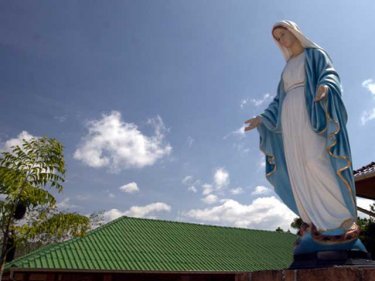The cross on top of the Our Lady Of Grace church looms large in the grounds of the Catholic Social Pastoral Centre in Bang Sak, a village in Phang Nga, just north of Phuket.
Around it lie several large buildings where visitors come for seminars and where people from surrounding villages come to learn, or to be cared for.
A statue of the Virgin Mary, high above some artificial ponds, occupies pride of place.
The domain of the priests and nuns now extends across a large part of the region, up through Takuapa to Kuraburi in northern Phang Nga, and south to the ''sleepy hollow'' centre of Thai Muang.
At least 20 large villages are involved in Catholic care projects.
Every Saturday, children's activities are held at the centre. Mental health continues to be part of the program for many visitors.
A jobs creation program is also underway. Caritas, the Italian charitable organisation, provides support.
Catholics, along with many other Christian groups and cults, arrived in the region in large numbers after the 2004 tsunami.
Some groups came to provide aid, others came to care and convert. Thai missionaries came south from Bankok and US missionaries flew in to visit refugee villages, eager to carry the afflicted victims to Christ.
Local Christian churches were quick to provide aid wherever it was needed, joining huge numbers of Thai volunteers.
Some of the locals, emotionally disturbed by the tsunami, were more receptive to a change in faith. Some appreciated the deeds of the Christian volunteers and converted out of admiration.
Other aspects of the religious upheaval triggered by the tsnuami were less admirable.
Phuketwan saw one group of 86 missionaries arrive from Tennessee, Virginia, Arkansas and North Carolina to dance the hoochee koochee with children, and later meet their parents, handing out gifts.
Their declared strategy was to convert refugees. The group's leader, Cyndy Waters, told Phuketwan: ''Whole families took off their necklaces with images of Buddha and replaced them with crosses.
''Eternal salvation would be the biggest benefit we could possibly deliver.''
While there were successes in conversions among Buddhist villagers and sea gypsies along the coast, the Muslim villagers tended to provide their own community support groups and remained largely unchanged.
And as soon as the missionaries left, many of the Buddhists replaced the cross with images of Buddha again.
There were, however, genuine conversions.
One woman, who returned to her village after a shopping expedition on the morning of the tsunami, found that her mother and father and her daughters, aged one and two, had been killed.
Nothing could ease her pain. Neighbors were awakened in the middle of the night as she left her bed to rage at the sea.
One day, a missionary told her that in Christianity, her young daughters would be safe in Heaven, in the arms of a caring God. That was what she needed to hear.
She converted on the spot. Soon after, she and her husband opened a new restaurant, the Amazing Grace.
One of her neighbors also promised to convert to Christianity if her young son was saved from an illness. He was, and she did.
At the same time, her husband, who had been caught in the wave but survived, kept a promise made in the swirling waters to become a Buddhist monk for three months if he lived.
So for a time, they went their different ways. Eventually, she became a Buddhist again.
Such were the routes to personal salvation in the difficult days after the tsunami.
Many of the groups bent on Christian conversion are no longer seen along the tsunami coast, where at one time their proselytizing alarmed both Buddhist, Muslim and local Christian leaders.
Not all of the new arrivals earned good reputations. A Thai nun, among the first to arrive in the early days as the Bang Sak centre was being built, told Phuketwan: ''Please call us Catholics, not Christians.''
There are certainly more Christians and more churches of many kinds along the Andaman coast now.
But it is a settled, tolerant place where people live together and where worship and religion are a matter for individuals and their hearts.
The sea gypsy communities suffered most, not from Christian conversion but from displacement.
Out of fear, many have not returned to their traditional seafaring life, on the fringes of remote Andaman Sea islands, opting instead for safer homes in gift villages some distance from the coast.
Here, their children mingle in schools with children from other backgrounds and religions and their romantic culture, preseved for generations by isolation, is gradually being lost.
That kind of accidental cultural conversion is probably the saddest aspect of the tsunami's aftermath.
The church at Bang Sak is scheduled to open on Sunday, February 17.





Hello Rev. Father,
My family and I will be travelling to Phuket on 16 October, 2010 and would be staying at the Katathani Beach Resort Hotel. My daughter wishes to be married at the resort in Phuket. We are born Catholics and live in Melbourne, Australia. I would appreciate if you can give me details on the catholic marriage ceremony by a catholic priest at the resort.
I would also like some information on the documents required for the ceremony as well as the charges.
God bless you.
Thanks and regards.
Yours in Christ.
Sherley.
Posted by sherley on July 7, 2010 19:39
Editor Comment:
Hello Sherley, I'm sure all of our readers will be delighted that your daughter has chosen Phuket for her wedding. We will certainly do our best at Phuketwan to find a catholic priest to celebrate the occasion. It's a beautiful spot, especially at that time of the year.